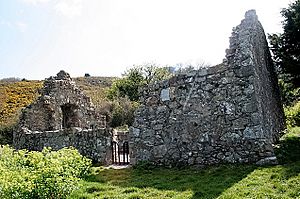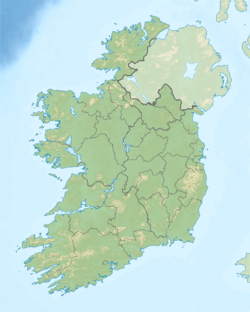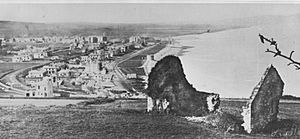Raheen-a-Cluig facts for kids
Quick facts for kids Raheen-a-Cluig |
|
|---|---|
| Raheenac[h]luig Church, Raheen na gClig, Raheen na Clig | |
|
Ráithín an Chloig
|
|

Raheen-a-Cluig viewed from the north
|
|
| 53°11′38″N 6°05′26″W / 53.193786°N 6.090484°W | |
| Location | Newcourt, Bray, County Wicklow |
| Country | Ireland |
| Denomination | Pre-Reformation Catholic |
| History | |
| Founded | c. 1200 |
| Dedication | St Michael or St Brendan |
| Architecture | |
| Functional status | ruined |
| Style | Norman |
| Years built | 13th century |
| Specifications | |
| Length | 12.5 m (41 ft) |
| Width | 5.3 m (17 ft) |
| Height | 2 m (6 ft 7 in) |
| Number of floors | 1 |
| Floor area | 66 m2 (710 sq ft) |
| Materials | stone |
| Administration | |
| Diocese | Dublin |
Raheen-a-Cluig is an old stone church from the Middle Ages. Today, its ruins are protected as a National Monument in Bray, Ireland. It stands as a reminder of centuries of local history.
Contents
Location and Views
The church is located on the side of Bray Head, a large hill by the sea. It sits about 300 meters from the beach. From the ruins, you can see amazing views of the Irish coastline. This spot was likely chosen for its beauty and clear view of the surrounding area.
History of the Church
What's in a Name?
Historians believe Raheen-a-Cluig was built in the 12th or 13th century. Its name comes from the Irish phrase Ráithín an Chloig. This could mean "little fort of the bell," but no one has found signs of a fort. Another idea is that Ráithín means a wall made of turf, or it could come from the word raithean, which means an area full of ferns.
From Church to Landmark
A powerful family called the Archbolds gave the church to a group of monks known as the Augustines. It might have been dedicated to either St. Michael or St. Brendan.
In the 1700s, parts of the church were repaired. Over the centuries, the empty building was sometimes used as a hiding spot for smugglers bringing goods into the country secretly. Local people have also told ghost stories about the old ruins.
Features of the Ruins
The church was a simple stone building. You can still see the doorway in the northeast wall. It once held a strong wooden door. There are also rounded windows in the east and west walls, which is a common feature of Norman style buildings.
The Church Grounds
Near the main church, there were two smaller buildings. There was also a special type of burial ground called a cillín. This was a place for people who could not be buried in the main cemetery, such as sailors who were shipwrecked or strangers to the town.
A short walk from the church, there was a holy well called Patrick's Well. As late as the 1830s, people who were sick would visit the well, hoping its waters would help them.
See also
 In Spanish: Iglesia de Raheen-a-Cluig para niños
In Spanish: Iglesia de Raheen-a-Cluig para niños



